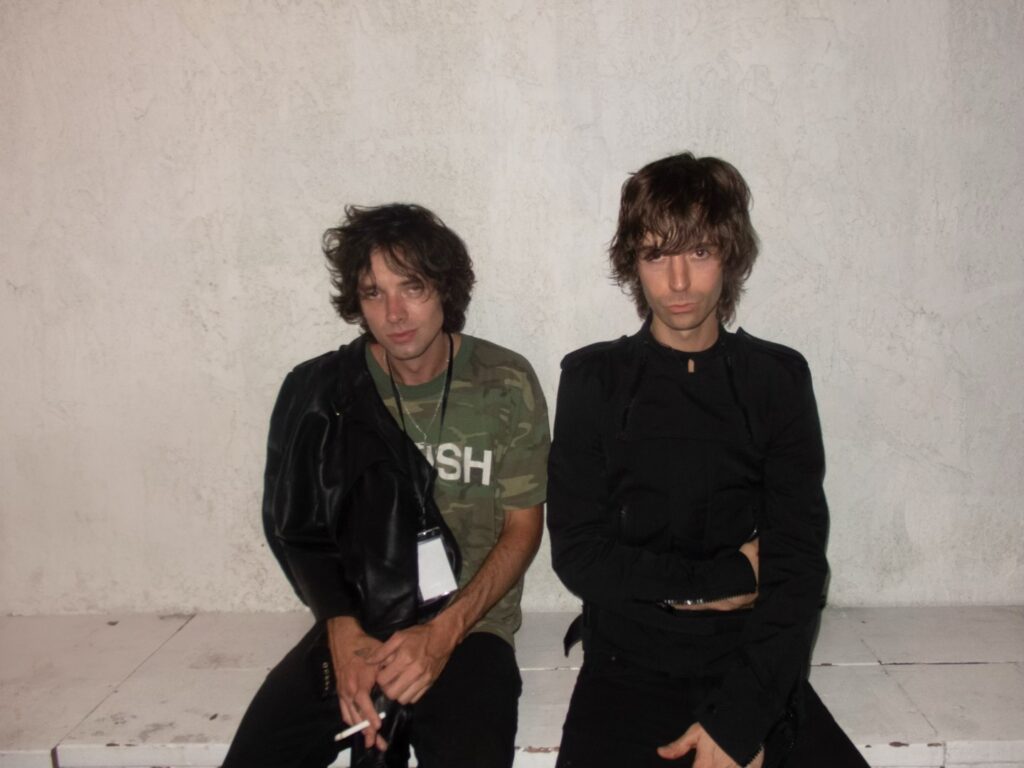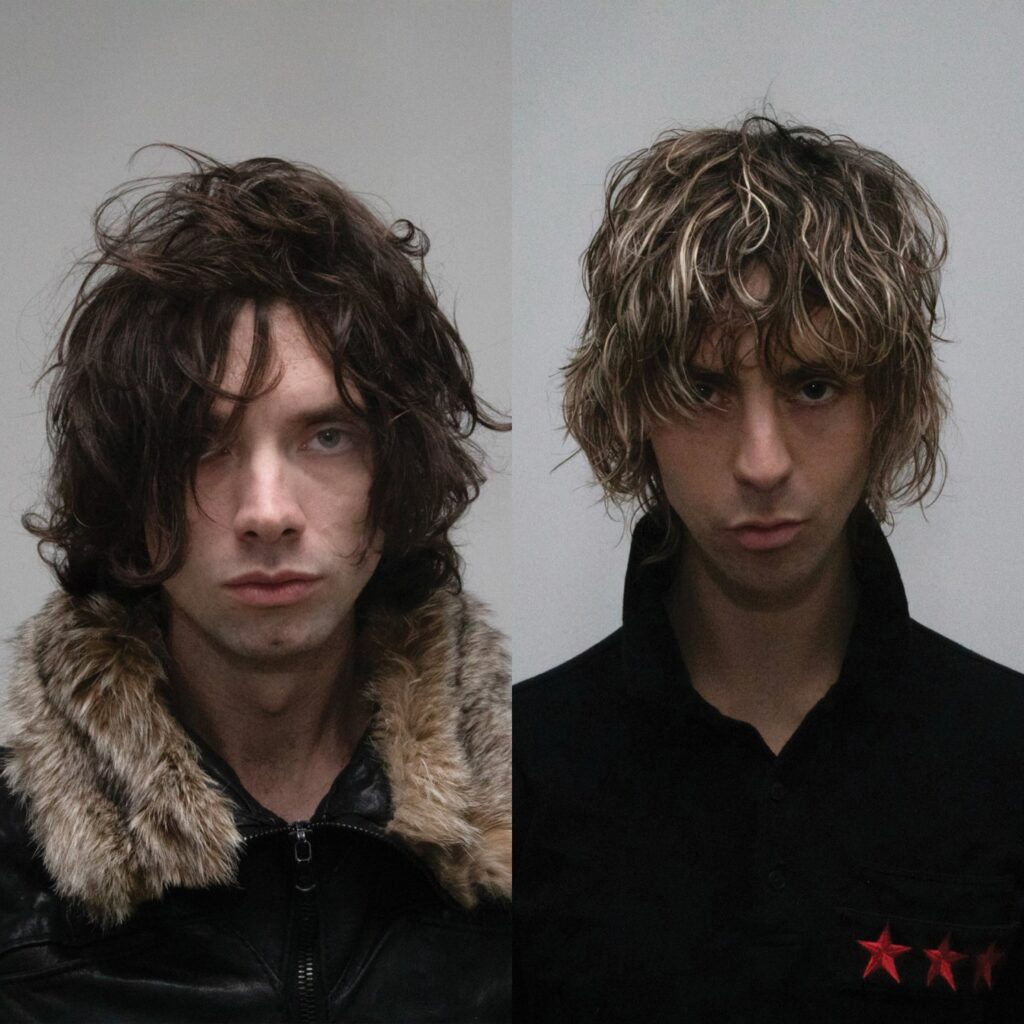
Courtesy of The Hellp
For the record, I’m a fan of The Hellp. Despite their aggressive cool-guy marketing — made complete with greasy hair, leather jackets, and an air of untouchability — the Los Angeles-based duo of Noah Dillon and Chandler Ransom Lucy make surprisingly heartfelt music: Amid the distorted 00’s-reminiscent electroclash of their debut album LL, songs like “Stunn” and “Caustic” chase moments of true, revelatory beauty, suggesting there’s depth to be found beyond their obscure designer jeans from Bosnia for which they’ve become more known thanks to a viral TikTok.
And though The Hellp are ostensibly dissatisfied with their public image, in conversation, they’re happy to lean on its most polarizing elements. Since coming on to the scene in 2015, the band has grown to hold a stable of strong — and perhaps unearned — opinions about the industry. Among their beliefs: music is dead; they’re the coolest band in the world; the industry hates them — but they hate the industry even more. Don’t even think about calling them “indie sleaze,” an association they’ll consider “insipid.” At best, you can say they’re just provocative, and at worst, they’re exactly what you’d expect from their pictures.
Wrapping up their year, the duo caught up with The FADER over a video call — Dillon still hungover from a recent bout of COVID and Lucy just, well, regular hungover — to take stock of their 2024 and share their thoughts on how they’re perceived, the commercialization of Kendrick Lamar and Drake’s rap beef, loving Brat, and the (supposed) collapse of culture.
This interview has been edited and condensed for clarity.
The FADER: LL is one of my favorite albums of the year.
NOAH DILLON: Thank you. I guess it’s not an appropriate response, but thanks for liking the record.
Why would that not be appropriate?
CHANDLER RANSOM LUCY: Well, it’s surprising when people like our shit.
DILLON: It seems like critically, it’s been decently received. So that’s cool.
Were critics something y’all were worried about?
DILLON: Yeah. I don’t know if Chandler is as worried as I am, but I’m a music nerd and I come from the Pitchfork school of thought. I have to make intellectual music even if it seems like people are only distilling and reducing our band to skinny jeans and indie sleaze, or whatever they want to think about it. But I really care about making a good product and a beautiful thing and something that’s important and usually critics resound to that sort of intention, and hopefully the outcome of the product reflects those intentions.
LUCY: Historically, no company or institution or anything ever wants to talk to us regardless of any cultural influence we’ve had or accolades we’ve accumulated or shows we’ve played or things we’ve released. No credible journalists or anything have ever acknowledged us. So anytime it happens we’re like, “Oh, cool.”
I’m surprised to hear that because in the past two years, y’all have been covered in quite a few publications.
DILLON: Yeah, but it’s still just been hollow behind those things. The industry, I don’t know if it’s that they don’t like us or if they just don’t understand us. But we’re just not industry darlings. We’re sort of underground darlings. But you always want what you don’t have. We’re the fat cows on one side trying to get more green grass on the other side.
What would you consider making it? The New York Times?
DILLON: I mean, that the goalpost is always changing. The main goal I said to myself was, “All I want is to play a show for 300 people in a major city like New York or L.A., and each one of those 300 people is starry eyed and it’s a very culturally relevant and impactful moment.” And that happened in 2020 or 2021. And then we started playing bigger shows and everything kind of got a lot bigger but to the detriment of what we were doing now. The rhetoric around the band, at least with the kids and younger generations, is just insipid sometimes and it makes me so angry. But you can’t control what people think. People aren’t interacting with The FACE magazine article, they’re interacting with an outfit TikTok of us that goes viral. The pieces of media people have seen from us that they’re forcibly [made to] interact with have not been the best reflection of what we are.
LUCY: All you can do is just try to be yourself a little bit harder the next day, you know.
Do you feel everyone is too focused on the aesthetics and not the music?
DILLON: More or less. But beyond the aesthetic even, it’s reduced down to jeans from Bosnia.
LUCY: Obviously people want to label shit, and if you look at a broad Venn diagram of New York and L.A., and you go, “Oh electronic music, indie sleaze, oh these guys fill this role because they look like The Strokes, they make this music.” It’s like, OK. But if you just look at it a little bit closely, these guys are making music that no one’s ever made before and they’re actually really cool and they really care about things, but obviously people don’t want to spend any time to read anything. They just wanna watch TikToks and immediately go, “Oh, it’s easy to understand this because it’s guys who are douchebags in jeans.” I think we’re douchebags in jeans for sure, but I think we’re a little bit more than that.
“We’re just not industry darlings. We’re sort of underground darlings. But you always want what you don’t have.”

Courtesy of The Hellp
I was going to ask about these labels, indie sleaze and such, that keep getting associated with the band and see how you guys are making peace with it, but it sounds like it’s still a very big existential thing.
LUCY: It doesn’t occupy as much space as it sounds like. It’s just something we get to talk about.
DILLON: I feel like I’m an anthropologist or a sociologist most of the time in my life and we’re in the time to think sociologically and anthology. So why not? Especially when you’re in a music project that really has been so culturally relevant, whether or not people want to admit it or not.
LUCY: Basically, I’m trying to say we’re not that vapid or like self-centered or narcissistic, you know, we think about a lot of other things diligently.
DILLON: You could ask me about the weight of different types of paper in regards to how pen ink seeps in and I would have just as an impassioned response.
LUCY: I was really just thinking about the texture of the socks that I’m wearing that I stole from my dad and how I’ve never seen socks like this.
In a previous interview, you guys said that music is ending. Do you still believe that?
DILLON: I think I said that. Chandler and I agree on about 90% of things so I try and not speak for everybody. But music is over to a degree. And by that, I mean it’s not just specifically music, it’s culture in general. The Western society that was birthed post-World War Two is coming to a climactic close. We’re probably in the penultimate stage because the fallout is still yet to take place. We’re living in the shadow of the death of culture, basically.
There’s plenty of people making good music but it doesn’t mean as much. Like, Michael Jackson could come back from the dead and make Thriller part two that’s better than Thriller one right now, but it wouldn’t mean nearly as much as it did when he dropped the initial release. Now, it’s like this fully hyper-manufactured industry. Like, this Kendrick Drake beef, 10, 15 years ago, that would be such a legendary hip-hop beef that could seem so transcendental and really evolved the culture, but now it was like, obviously highly manufactured because Kendrick’s streams were falling off. So TDE and whoever needed to figure out how to make something go down. It’s like a clear business strategy at this point.
Luckily, we’re old enough to remember how things used to feel. We remember that feeling and we’re just trying to recreate some of those feelings that already exist inside of us. Because things don’t feel special like they used to. But yeah, music’s fucked. Like I don’t listen to music anymore. Chandler barely does. And that’s not because we’re old. I think everybody sort of feels that.
So you guys don’t have a favorite album of the year?
DILLON: I have favorite albums of the year but they mean nothing to me still. I think the exception to that is Brat. But to my point… I think POP 2 is a much better record than Brat. I think POP 2 was genius. I think it was so cutting edge and way too ahead of its time, because it didn’t get the acclaim it should have. But how long has Charli [xcx] been doing this? Since 2010? She remembers what it was like, and she’s been strong enough and she’s a good enough artist to and has a good enough team to finally package it in a perfect way to where ubiquitously and unanimously 15-year-olds and 45-year-olds could understand this story. And I guess that’s what art is, right? It’s how well you can communicate your product. If you can communicate a bad product really well, people are still gonna love it, you know.
It’s all about marketing.
DILLON: Completely, and like, we aren’t good at marketing. I guess we’re good at marketing ourselves in the wrong way.
It sounds like you guys have a very cynical outlook on the industry and culture. What keeps you guys going and making music?
DILLON: You choose a path and you have to go down that path. That’s what being an adult is about. And also, life is beautiful and vivid. You can fall in love or you could have a snack or you could believe in God or you could Hail Satan or you could go to the beach or you can think about the mystery of literature, you could do anything you want. Life is inherently just ripe. I don’t think we’re cynical. I think we’re just cogent.
LUCY: What keeps us making music is just if we don’t do it, nobody else will. I really believe that. I don’t think anybody else is equipped in our context to create this product and give to the world what we’re trying to do, and if anybody else was to do it, which people are trying to do right now, it’s not gonna be nearly as good.
DILLON: I care about legacy, the canon of this project, and I just really want people to see it for what I think it was historically as time moves forward.
